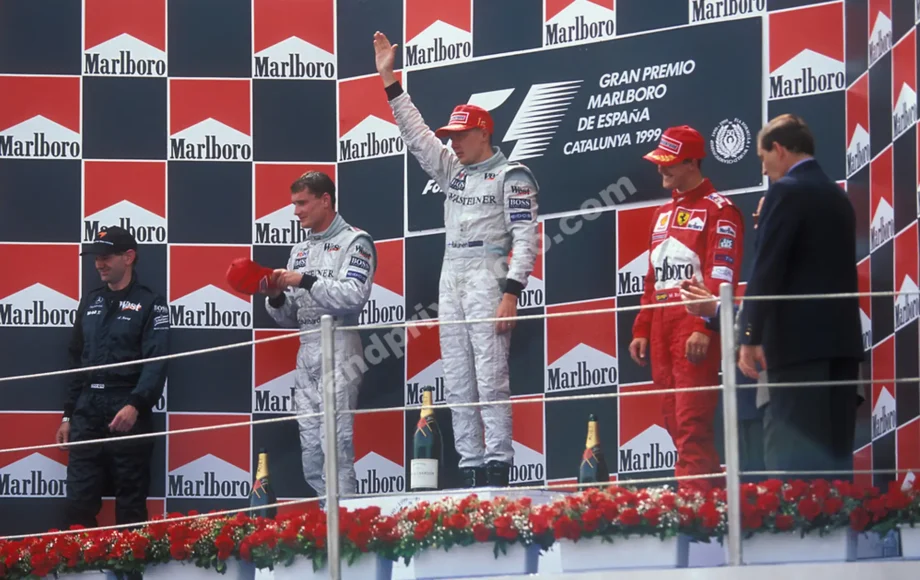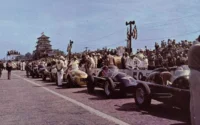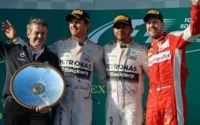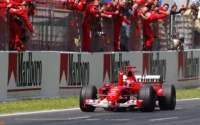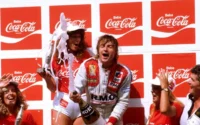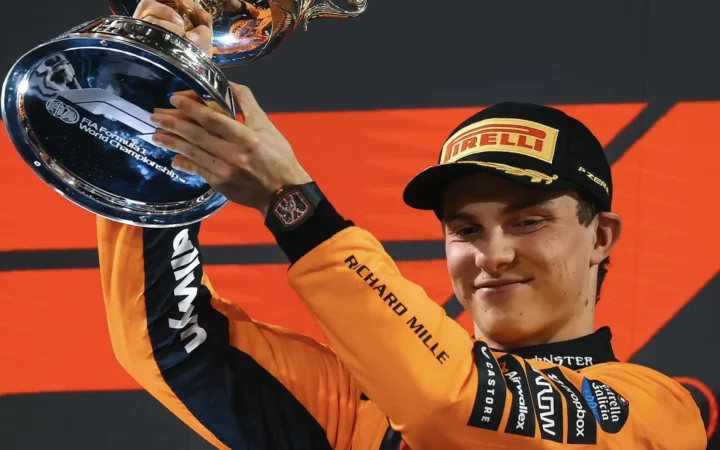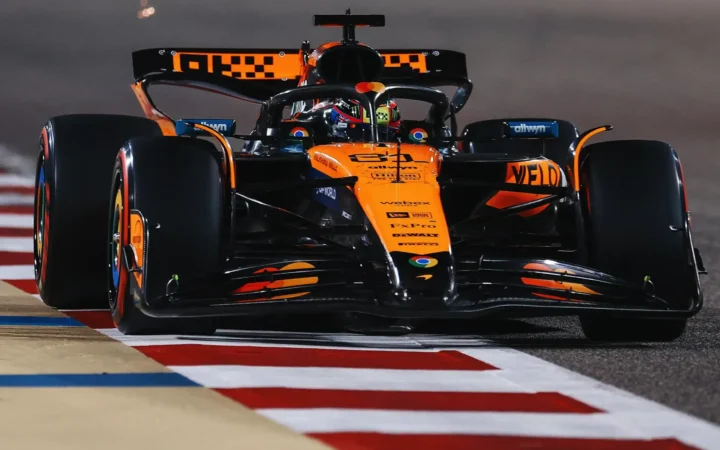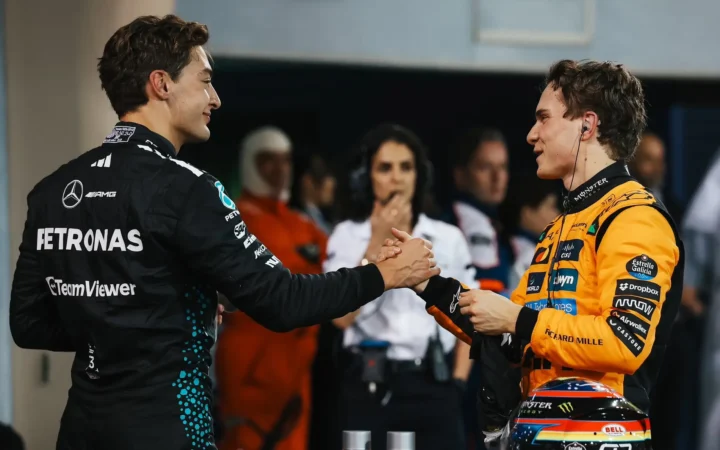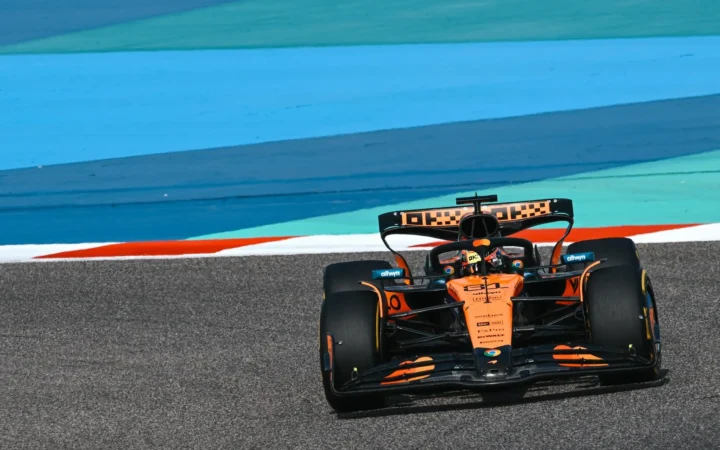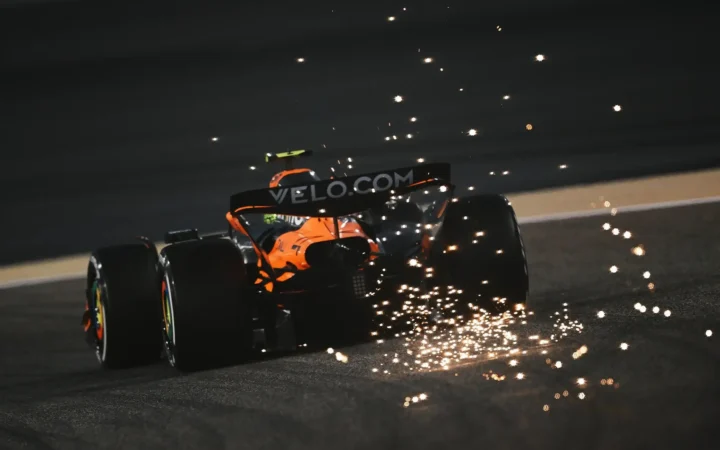What happened on this day, May 30 in Formula 1 history? Find out interesting facts and stories about Formula 1 on this day.
Indianapolis 500 Highlights and Tragic Moments
The Indianapolis 500, first held in 1911, was included in the Formula One World Championship from 1950 to 1960. This event has seen numerous highlights and tragic incidents. Here are a few notable ones:
1911
The inaugural Indianapolis 500 was held on a Tuesday, May 30, 1911, and drew an international crowd. Forty-six cars entered, with 40 qualifying by recording a 75 mph lap. Ray Harroun won the race using a rear-view mirror instead of a riding mechanic. However, his victory was marred by controversy as Ralph Mulford, who finished second, protested that Harroun had completed one lap too few. The protest was rejected, but the debate lingered for years. Harroun retired after winning the $10,000 prize, never to race again. Unfortunately, the event also saw its first fatality when mechanic Sam Dickson died after Arthur Greiner’s car hit a wall.
1939
Defending champion Floyd Roberts died from head injuries after his car was clipped and crashed into a tree.
1950
The 1950 Indianapolis 500 was the 34th running of the race. It was significant as it was the first time the Indy 500 was included in the FIA Formula One World Championship. Johnnie Parsons won the race in an Offenhauser-powered Kurtis Kraft. Bill Holland took second place with Mauri Rose in third. The race was stopped after 138 laps (345 miles) due to rain, making it one of the shortest completed Indy 500s. As part of the 1950 Formula One season, this race awarded World Championship points, though most Formula One teams did not participate.
Full Race Report
1950 Indianapolis 500 Race Results
| Pos | No | Driver | Car | Laps | Time/retired | Pts |
|---|---|---|---|---|---|---|
| 1 | 1 | Johnnie Parsons | Kurtis Kraft Offenhauser | 138 | 2:46:55.970 | 9 |
| 2 | 3 | Bill Holland | Deidt Offenhauser | 137 | +1 lap | 6 |
| 3 | 31 | Mauri Rose | Deidt Offenhauser | 137 | +1 lap | 4 |
| 4 | 54 | Cecil Green | Kurtis Kraft Offenhauser | 137 | +1 lap | 3 |
| 5 | 17 | Joie Chitwood | Kurtis Kraft Offenhauser | SHC | 1 | |
| 5 | 17 | Tony Bettenhausen | Kurtis Kraft Offenhauser | 136 | +2 laps | 1 |
| 6 | 8 | Lee Wallard | Moore Offenhauser | 136 | +2 laps | 0 |
| 7 | 98 | Walt Faulkner | Kurtis Kraft Offenhauser | 135 | +3 laps | 0 |
| 8 | 5 | George Connor | Lesovsky Offenhauser | 135 | +3 laps | 0 |
| 9 | 7 | Paul Russo | Nichels Offenhauser | 135 | +3 laps | 0 |
| 10 | 59 | Pat Flaherty | Kurtis Kraft Offenhauser | 135 | +3 laps | 0 |
| 11 | 2 | Myron Fohr | Marchese Offenhauser | 133 | +5 laps | 0 |
| 12 | 18 | Duane Carter | Stevens Offenhauser | 133 | +5 laps | 0 |
| 13 | 15 | Mack Hellings | Kurtis Kraft Offenhauser | 132 | +6 laps | 0 |
| 14 | 49 | Jack McGrath | Kurtis Kraft Offenhauser | 131 | DNF | 0 |
| 15 | 55 | Troy Ruttman | Lesovsky Offenhauser | 130 | +8 laps | 0 |
| 16 | 75 | Gene Hartley | Langley Offenhauser | 128 | +10 laps | 0 |
| 17 | 22 | Jimmy Davies | Ewing Offenhauser | 128 | +10 laps | 0 |
| 18 | 62 | Johnny McDowell | Kurtis Kraft Offenhauser | 128 | +10 laps | 0 |
| 19 | 4 | Walt Brown | Kurtis Kraft Offenhauser | 127 | +11 laps | 0 |
| 20 | 21 | Spider Webb | Maserati Offenhauser | 126 | +12 laps | 0 |
| 21 | 81 | Jerry Hoyt | Kurtis Kraft Offenhauser | 125 | +13 laps | 0 |
| 22 | 27 | Walt Ader | Rae Offenhauser | 123 | +15 laps | 0 |
| 23 | 77 | Jackie Holmes | Olson Offenhauser | 123 | DNF | 0 |
| 24 | 76 | Jim Rathmann | Wetteroth Offerhauser | 122 | +16 laps | 0 |
| 25 | 12 | Henry Banks | Maserati Offenhauser | SHC | 0 | |
| 25 | 12 | Fred Agabashian | Maserati Offenhauser | 112 | DNF | 0 |
| 26 | 67 | Bill Schindler | Snowberger Offenhauser | 111 | DNF | 0 |
| 27 | 24 | Bayliss Levrett | Adams Offenhauser | SHC | 0 | |
| 27 | 24 | Bill Cantrell | Adams Offenhauser | 108 | DNF | 0 |
| 28 | 28 | Fred Agabashian | Kurtis Kraft Offenhauser | 64 | DNF | 0 |
| 29 | 61 | Jimmy Jackson | Kurtis Kraft Cummins | 52 | DNF | 0 |
| 30 | 23 | Sam Hanks | Kurtis Kraft Offenhauser | 42 | DNF | 0 |
| 31 | 14 | Tony Bettenhausen | Deidt Offenhauser | 30 | DNF | 0 |
| 32 | 45 | Dick Rathmann | Watson Offenhauser | 25 | DNF | 0 |
| 33 | 69 | Duke Dinsmore | Kurtis Kraft Offenhauser | 10 | DNF | 0 |
1951
The 1951 Indianapolis 500 was the second round of the eight-race World Championship season. However, as it took place just three days after the Swiss Grand Prix, it failed to attract any regular Grand Prix competitors, participation was logistically impractical.
Lee Wallard emerged as the race winner, earning 9 points towards the World Championship—8 for victory and 1 for setting the fastest lap. Despite not competing in any other World Championship rounds that season, he finished seventh in the final standings.
Mike Nazaruk secured second place, while third was shared between Jack McGrath, who led the first 100 laps, and Manny Ayulo, who took over for the second half of the race.
1951 Indianapolis 500 Race Results
| Pos | No | Driver | Car | Laps | Time/retired | Pts |
|---|---|---|---|---|---|---|
| 1 | 99 | Lee Wallard | Kurtis Kraft Offenhauser | 200 | 3:57:38.050 | 9 |
| 2 | 83 | Mike Nazaruk | Kurtis Kraft Offenhauser | 200 | +107.243s | 6 |
| 3 | 9 | Manny Ayulo | Kurtis Kraft Offenhauser | 200 | 2 | |
| 3 | 9 | Jack McGrath | Kurtis Kraft Offenhauser | SHC | 2 | |
| 4 | 57 | Andy Linden | Sherman Offenhauser | 200 | 3 | |
| 5 | 52 | Bobby Ball | Schroeder Offenhauser | 200 | 2 | |
| 6 | 1 | Henry Banks | Moore Offenhauser | 200 | 0 | |
| 7 | 68 | Carl Forberg | Kurtis Kraft Offenhauser | 193 | +7 laps | 0 |
| 8 | 27 | Duane Carter | Deidt Offenhauser | 180 | +20 laps | 0 |
| 9 | 5 | Tony Bettenhausen | Deidt Offenhauser | 178 | DNF | 0 |
| 10 | 18 | Duke Nalon | Kurtis Kraft Novi | 151 | DNF | 0 |
| 11 | 69 | Gene Force | Kurtis Kraft Offenhauser | 142 | DNF | 0 |
| 12 | 25 | Sam Hanks | Kurtis Kraft Offenhauser | 135 | DNF | 0 |
| 13 | 10 | Bill Schindler | Kurtis Kraft Offenhauser | 129 | DNF | 0 |
| 14 | 16 | Mauri Rose | Deidt Offenhauser | 126 | DNF | 0 |
| 15 | 2 | Walt Faulkner | Kuzma Offenhauser | 123 | DNF | 0 |
| 16 | 76 | Jimmy Davies | Pawl Offenhauser | 110 | DNF | 0 |
| 17 | 59 | Fred Agabashian | Kurtis Kraft Offenhauser | 109 | DNF | 0 |
| 18 | 73 | Carl Scarborough | Kurtis Kraft Offenhauser | 100 | DNF | 0 |
| 19 | 71 | Bill Mackey | Hall Offenhauser | 97 | DNF | 0 |
| 20 | 8 | Chuck Stevenson | Marchese Offenhauser | 93 | DNF | 0 |
| 21 | 3 | Johnnie Parsons | Kurtis Kraft Offenhauser | 87 | DNF | 0 |
| 22 | 4 | Cecil Green | Kurtis Kraft Offenhauser | 80 | DNF | 0 |
| 23 | 98 | Troy Ruttman | Kurtis Kraft Offenhauser | 78 | DNF | 0 |
| 24 | 6 | Duke Dinsmore | Schroeder Offenhauser | 73 | DNF | 0 |
| 25 | 32 | Chet Miller | Kurtis Kraft Novi | 56 | DNF | 0 |
| 26 | 44 | Walt Brown | Kurtis Kraft Offenhauser | 55 | DNF | 0 |
| 27 | 48 | Rodger Ward | Bromme Offenhauser | 34 | DNF | 0 |
| 28 | 23 | Cliff Griffith | Kurtis Kraft Offenhauser | 30 | DNF | 0 |
| 29 | 81 | Bill Vukovich | Trevis Offenhauser | 29 | DNF | 0 |
| 30 | 22 | George Connor | Lesovsky Offenhauser | 29 | DNF | 0 |
| 31 | 19 | Mack Hellings | Deidt Offenhauser | 18 | DNF | 0 |
| 32 | 12 | Johnny McDowell | Maserati-Offenhauser | 15 | DNF | 0 |
| 33 | 26 | Joe James | Watson Offenhauser | 8 | DNF | 0 |
1952
The 1952 Indianapolis 500 was the second round of the eight-race 1952 World Championship season. Unlike previous years, the race featured a notable entry from a European-based driver competing for the title—Alberto Ascari, driving for Ferrari. He became the first serious World Championship contender to attempt the Indy 500, opting to skip the Swiss Grand Prix to participate. However, his race ended early, and he finished 31st without scoring any points.
Despite this setback, Ascari went on to dominate the remainder of the season, winning all seven of the remaining races and securing the 1952 World Championship.
Troy Ruttman claimed victory at Indianapolis, earning 8 points toward the championship, which placed him seventh in the final standings. Jim Rathmann finished second, while Sam Hanks secured third place.
1952 Indianapolis 500 Race Results
| Pos | No | Driver | Car | Laps | Time/retired | Pts |
|---|---|---|---|---|---|---|
| 1 | 98 | Troy Ruttman | Kuzma Offenhauser | 200 | 3:52:41.880 | 8 |
| 2 | 59 | Jim Rathmann | Kurtis Kraft Offenhauser | 200 | +242.329s | 6 |
| 3 | 18 | Sam Hanks | Kurtis Kraft Offenhauser | 200 | 4 | |
| 4 | 1 | Duane Carter | Lesovsky Offenhauser | 200 | 3 | |
| 5 | 33 | Art Cross | Kurtis Kraft Offenhauser | 200 | 2 | |
| 6 | 77 | Jimmy Bryan | Kurtis Kraft Offenhauser | 200 | 0 | |
| 7 | 37 | Jimmy Reece | Kurtis Kraft Offenhauser | 200 | 0 | |
| 8 | 54 | George Connor | Kurtis Kraft Offenhauser | 200 | 0 | |
| 9 | 22 | Cliff Griffith | Kurtis Kraft Offenhauser | 200 | 0 | |
| 10 | 5 | Johnnie Parsons | Kurtis Kraft Offenhauser | 200 | 0 | |
| 11 | 4 | Jack McGrath | Kurtis Kraft Offenhauser | 200 | 0 | |
| 12 | 29 | Jim Rigsby | Watson Offenhauser | 200 | 0 | |
| 13 | 14 | Joe James | Kurtis Kraft Offenhauser | 200 | 0 | |
| 14 | 7 | Bill Schindler | Stevens Offenhauser | 200 | 0 | |
| 15 | 65 | George Fonder | Sherman Offenhauser | 197 | +3 laps | 0 |
| 16 | 81 | Eddie Johnson | Trevis Offenhauser | 193 | +7 laps | 0 |
| 17 | 26 | Bill Vukovich | Kurtis Kraft Offenhauser | 191 | DNF | 1 |
| 18 | 16 | Chuck Stevenson | Kurtis Kraft Offenhauser | 187 | +13 laps | 0 |
| 19 | 2 | Henry Banks | Lesovsky Offenhauser | 184 | +16 laps | 0 |
| 20 | 8 | Manny Ayulo | Lesovsky Offenhauser | 184 | +16 laps | 0 |
| 21 | 31 | Johnny McDowell | Kurtis Kraft Offenhauser | 182 | +18 laps | 0 |
| 22 | 48 | Spider Webb | Bromme Offenhauser | 162 | DNF | 0 |
| 23 | 34 | Rodger Ward | Kurtis Kraft Offenhauser | 130 | DNF | 0 |
| 24 | 27 | Tony Bettenhausen | Deidt Offenhauser | 93 | DNF | 0 |
| 25 | 36 | Duke Nalon | Kurtis Kraft Novi | 84 | DNF | 0 |
| 26 | 73 | Bob Sweikert | Kurtis Kraft Offenhauser | 77 | DNF | 0 |
| 27 | 28 | Fred Agabashian | Kurtis Kraft Cummins | 71 | DNF | 0 |
| 28 | 67 | Gene Hartley | Kurtis Kraft Offenhauser | 65 | DNF | 0 |
| 29 | 93 | Bob Scott | Kurtis Kraft Offenhauser | 49 | DNF | 0 |
| 30 | 21 | Chet Miller | Kurtis Kraft Novi | 41 | DNF | 0 |
| 31 | 12 | Alberto Ascari | Ferrari | 40 | DNF | 0 |
| 32 | 55 | Bobby Ball | Stevens Offenhauser | 34 | DNF | 0 |
| 33 | 9 | Andy Linden | Kurtis Kraft Offenhauser | 20 | DNF | 0 |
1953
The 1953 Indianapolis 500 was the second round of the nine-race 1953 World Championship season. However, as in previous years, the event failed to attract any regular Grand Prix competitors.
Bill Vukovich dominated the race, securing victory and earning 9 points toward the World Championship—8 for the win and 1 for setting the fastest lap. Despite not participating in any other World Championship rounds, his victory was enough to place him seventh in the final season standings.
Art Cross finished second, while third place was shared between Sam Hanks and Duane Carter, with Carter taking over driving duties for the final 48 laps of the race.
Carl Scarborough, 39, collapsed from heat exhaustion after the Indy 500, highlighting the extreme conditions drivers face.
1953 Indianapolis 500 Race Results
| Pos | No | Driver | Car | Laps | Time/retired | Pts |
|---|---|---|---|---|---|---|
| 1 | 14 | Bill Vukovich | Kurtis Kraft Offenhauser | 200 | 3:53:01.690 | 9 |
| 2 | 16 | Art Cross | Kurtis Kraft Offenhauser | 200 | +210.872s | 6 |
| 3 | 3 | Sam Hanks | Kurtis Kraft Offenhauser | SHC | 2 | |
| 3 | 3 | Duane Carter | Kurtis Kraft Offenhauser | 200 | 2 | |
| 4 | 59 | Fred Agabashian | Kurtis Kraft Offenhauser | SHC | 1.5 | |
| 4 | 59 | Paul Russo | Kurtis Kraft Offenhauser | 200 | 1.5 | |
| 5 | 5 | Jack McGrath | Kurtis Kraft Offenhauser | 200 | 2 | |
| 6 | 48 | Jimmy Daywalt | Kurtis Kraft Offenhauser | 200 | 0 | |
| 7 | 2 | Jim Rathmann | Kurtis Kraft Offenhauser | SHC | 0 | |
| 7 | 2 | Eddie Johnson | Kurtis Kraft Offenhauser | 200 | 0 | |
| 8 | 12 | Ernie McCoy | Stevens Offenhauser | 200 | 0 | |
| 9 | 98 | Tony Bettenhausen | Kuzma Offenhauser | SHC | 0 | |
| 9 | 98 | Chuck Stevenson | Kuzma Offenhauser | SHC | 0 | |
| 9 | 98 | Gene Hartley | Kuzma Offenhauser | 196 | DNF | 0 |
| 10 | 53 | Jimmy Davies | Kurtis Kraft Offenhauser | 193 | +7 laps | 0 |
| 11 | 9 | Duke Nalon | Kurtis Kraft Novi | 191 | DNF | 0 |
| 12 | 73 | Carl Scarborough | Kurtis Kraft Offenhauser | SHC | 0 | |
| 12 | 73 | Bob Scott | Kurtis Kraft Offenhauser | 190 | +10 laps | 0 |
| 13 | 88 | Manny Ayulo | Kuzma Offenhauser | 184 | DNF | 0 |
| 14 | 8 | Jimmy Bryan | Schroeder Offenhauser | 183 | +17 laps | 0 |
| 15 | 49 | Bill Holland | Kurtis Kraft Offenhauser | SHC | 0 | |
| 15 | 49 | Jim Rathmann | Kurtis Kraft Offenhauser | 177 | DNF | 0 |
| 16 | 92 | Rodger Ward | Kurtis Kraft Offenhauser | 177 | DNF | 0 |
| 16 | 92 | Andy Linden | Kurtis Kraft Offenhauser | SHC | 0 | |
| 16 | 92 | Duke Dinsmore | Kurtis Kraft Offenhauser | SHC | 0 | |
| 17 | 23 | Walt Faulkner | Kurtis Kraft Offenhauser | SHC | 0 | |
| 17 | 23 | Johnny Mantz | Kurtis Kraft Offenhauser | 176 | +24 laps | 0 |
| 18 | 22 | Marshall Teague | Kurtis Kraft Offenhauser | 169 | DNF | 0 |
| 19 | 62 | Spider Webb | Kurtis Kraft Offenhauser | SHC | 0 | |
| 19 | 62 | Johnny Thomson | Kurtis Kraft Offenhauser | SHC | 0 | |
| 19 | 62 | Jackie Holmes | Kurtis Kraft Offenhauser | 166 | DNF | 0 |
| 20 | 51 | Bob Sweikert | Kuzma Offenhauser | 151 | DNF | 0 |
| 21 | 83 | Mike Nazaruk | Turner Offenhauser | 146 | DNF | 0 |
| 22 | 77 | Pat Flaherty | Kurtis Kraft Offenhauser | 115 | DNF | 0 |
| 23 | 55 | Jerry Hoyt | Kurtis Kraft Offenhauser | SHC | 0 | |
| 23 | 55 | Chuck Stevenson | Kurtis Kraft Offenhauser | SHC | 0 | |
| 23 | 55 | Andy Linden | Kurtis Kraft Offenhauser | 107 | DNF | 0 |
| 24 | 4 | Duane Carter | Lesovsky Offenhauser | 94 | DNF | 0 |
| 25 | 7 | Paul Russo | Kurtis Kraft Offenhauser | 89 | DNF | 0 |
| 26 | 21 | Johnnie Parsons | Kurtis Kraft Offenhauser | 86 | DNF | 0 |
| 27 | 38 | Don Freeland | Watson Offenhauser | 76 | DNF | 0 |
| 28 | 41 | Gene Hartley | Kurtis Kraft Offenhauser | 53 | DNF | 0 |
| 29 | 97 | Chuck Stevenson | Kuzma Offenhauser | 42 | DNF | 0 |
| 30 | 99 | Cal Niday | Kurtis Kraft Offenhauser | 30 | DNF | 0 |
| 31 | 29 | Bob Scott | Bromme Offenhauser | 14 | DNF | 0 |
| 32 | 56 | Johnny Thomson | Del Roy Offenhauser | 6 | DNF | 0 |
| 33 | 32 | Andy Linden | Stevens Offenhauser | 3 | DNF | 0 |
1955
Bill Vukovich, a two-time Indy 500 winner, died at the 1955 Indianapolis 500 when his car became airborne and crashed after being hit. His death marked the first fatality in a FIA World Championship event. Bob Sweikert won the race ahead of Tony Bettenhausen and Paul Russo in second as a shared drive, with Jimmy Davies taking third place.
1955 Indianapolis 500 Race Results
| Pos | No | Driver | Car | Laps | Time/retired | Pts |
|---|---|---|---|---|---|---|
| 1 | 6 | Bob Sweikert | Kurtis Kraft Offenhauser | 200 | 3:53:59.530 | 8 |
| 2 | 10 | Tony Bettenhausen | Kurtis Kraft Offenhauser | 200 | +163.560s | 3 |
| 2 | 10 | Paul Russo | Kurtis Kraft Offenhauser | SHC | 3 | |
| 3 | 15 | Jimmy Davies | Kurtis Kraft Offenhauser | 200 | OK | 4 |
| 4 | 44 | Johnny Thomson | Kuzma Offenhauser | 200 | OK | 3 |
| 5 | 77 | Walt Faulkner | Kurtis Kraft Offenhauser | 200 | OK | 1 |
| 5 | 77 | Bill Homeier | Kurtis Kraft Offenhauser | SHC | 1 | |
| 6 | 19 | Andy Linden | Kurtis Kraft Offenhauser | 200 | OK | 0 |
| 7 | 71 | Al Herman | Kurtis Kraft Offenhauser | 200 | OK | 0 |
| 8 | 29 | Pat O’Connor | Kurtis Kraft Offenhauser | 200 | OK | 0 |
| 9 | 48 | Jimmy Daywalt | Kurtis Kraft Offenhauser | 200 | OK | 0 |
| 10 | 89 | Pat Flaherty | Kurtis Kraft Offenhauser | 200 | OK | 0 |
| 11 | 98 | Duane Carter | Kuzma Offenhauser | 197 | +3 laps | 0 |
| 12 | 41 | Chuck Weyant | Kurtis Kraft Offenhauser | 196 | +4 laps | 0 |
| 13 | 83 | Eddie Johnson | Trevis Offenhauser | 196 | +4 laps | 0 |
| 14 | 33 | Jim Rathmann | Epperly Offenhauser | 191 | +9 laps | 0 |
| 15 | 12 | Don Freeland | Phillips Offenhauser | 178 | DNF | 0 |
| 16 | 22 | Cal Niday | Kurtis Kraft Offenhauser | 170 | DNF | 0 |
| 17 | 99 | Art Cross | Kurtis Kraft Offenhauser | 168 | DNF | 0 |
| 18 | 81 | Shorty Templeman | Trevis Offenhauser | 142 | DNF | 0 |
| 19 | 8 | Sam Hanks | Kurtis Kraft Offenhauser | 134 | DNF | 0 |
| 20 | 31 | Keith Andrews | Schroeder Offenhauser | 120 | DNF | 0 |
| 21 | 16 | Johnnie Parsons | Kurtis Kraft Offenhauser | 119 | DNF | 0 |
| 22 | 37 | Eddie Russo | Pawl Offenhauser | 112 | DNF | 0 |
| 23 | 49 | Ray Crawford | Kurtis Kraft Offenhauser | 111 | DNF | 0 |
| 24 | 1 | Jimmy Bryan | Kuzma Offenhauser | 90 | DNF | 0 |
| 25 | 4 | Bill Vukovich | Kurtis Kraft Offenhauser | 56 | DNF | 1 |
| 26 | 3 | Jack McGrath | Kurtis Kraft Offenhauser | 54 | DNF | 0 |
| 27 | 42 | Al Keller | Kurtis Kraft Offenhauser | 54 | DNF | 0 |
| 28 | 27 | Rodger Ward | Kuzma Offenhauser | 53 | DNF | 0 |
| 29 | 39 | Johnny Boyd | Kurtis Kraft Offenhauser | 53 | DNF | 0 |
| 30 | 68 | Ed Elisian | Kurtis Kraft Offenhauser | 53 | DNF | 0 |
| 31 | 23 | Jerry Hoyt | Stevens Offenhauser | 40 | DNF | 0 |
| 32 | 14 | Fred Agabashian | Kurtis Kraft Offenhauser | 39 | DNF | 0 |
| 33 | 5 | Jimmy Reece | Pankratz Offenhauser | 10 | DNF | 0 |
1956
The 1956 Indianapolis 500 served as the third round of the eight-race World Championship season. However, the event failed to attract participation from the regular Grand Prix competitors. Former World Champion Giuseppe Farina attempted to enter but struggled to bring his car up to speed and was ultimately unable to make a qualifying attempt.
Pat Flaherty claimed victory in the race, earning eight points towards the World Championship. Despite not competing in any other rounds that season, he finished fifth in the final standings—the highest-ever championship placement for an Indianapolis 500 winner during the race’s 11-year tenure on the World Championship calendar. Sam Hanks finished second, with Don Freeland securing third place.
1956 Indianapolis 500 Race Results
| Pos | No | Driver | Car | Laps | Time/retired | Pts |
|---|---|---|---|---|---|---|
| 1 | 8 | Pat Flaherty | Watson Offenhauser | 200 | 3:53:28.840 | 8 |
| 2 | 4 | Sam Hanks | Kurtis Kraft Offenhauser | 200 | +20.450s | 6 |
| 3 | 16 | Don Freeland | Phillips Offenhauser | 200 | 4 | |
| 4 | 98 | Johnnie Parsons | Kuzma Offenhauser | 200 | 3 | |
| 5 | 73 | Dick Rathmann | Kurtis Kraft Offenhauser | 200 | 2 | |
| 6 | 1 | Bob Sweikert | Kuzma Offenhauser | 200 | 0 | |
| 7 | 14 | Bob Veith | Kurtis Kraft Offenhauser | 200 | 0 | |
| 8 | 19 | Rodger Ward | Kurtis Kraft Offenhauser | 200 | 0 | |
| 9 | 26 | Jimmy Reece | Lesovsky Offenhauser | 200 | 0 | |
| 10 | 27 | Cliff Griffith | Stevens Offenhauser | 199 | +1 lap | 0 |
| 11 | 82 | Gene Hartley | Kuzma Offenhauser | 196 | +4 laps | 0 |
| 12 | 42 | Fred Agabashian | Kurtis Kraft Offenhauser | 196 | +4 laps | 0 |
| 13 | 57 | Bob Christie | Kurtis Kraft Offenhauser | 196 | +4 laps | 0 |
| 14 | 55 | Al Keller | Kurtis Kraft Offenhauser | 195 | +5 laps | 0 |
| 15 | 81 | Eddie Johnson | Kuzma Offenhauser | 195 | +5 laps | 0 |
| 16 | 41 | Billy Garrett | Kuzma Offenhauser | 194 | +6 laps | 0 |
| 17 | 64 | Duke Dinsmore | Kurtis Kraft Offenhauser | 191 | +9 laps | 0 |
| 18 | 7 | Pat O’Connor | Kurtis Kraft Offenhauser | 187 | +13 laps | 0 |
| 19 | 2 | Jimmy Bryan | Kuzma Offenhauser | 185 | +15 laps | 0 |
| 20 | 24 | Jim Rathmann | Kurtis Kraft Offenhauser | 175 | DNF | 0 |
| 21 | 34 | Johnnie Tolan | Kurtis Kraft Offenhauser | 173 | DNF | 0 |
| 22 | 99 | Tony Bettenhausen | Kurtis Kraft Offenhauser | 160 | DNF | 0 |
| 23 | 10 | Ed Elisian | Kurtis Kraft Offenhauser | SHC | 0 | |
| 23 | 10 | Eddie Russo | Kurtis Kraft Offenhauser | 160 | DNF | 0 |
| 24 | 48 | Jimmy Daywalt | Kurtis Kraft Offenhauser | 134 | DNF | 0 |
| 25 | 54 | Jack Turner | Kurtis Kraft Offenhauser | 131 | DNF | 0 |
| 26 | 89 | Keith Andrews | Kurtis Kraft Offenhauser | 94 | DNF | 0 |
| 27 | 5 | Andy Linden | Kurtis Kraft Offenhauser | 90 | DNF | 0 |
| 28 | 12 | Al Herman | Kurtis Kraft Offenhauser | 74 | DNF | 0 |
| 29 | 49 | Ray Crawford | Kurtis Kraft Offenhauser | 49 | DNF | 0 |
| 30 | 15 | Johnny Boyd | Kurtis Kraft Offenhauser | 35 | DNF | 0 |
| 31 | 53 | Troy Ruttman | Kurtis Kraft Offenhauser | 22 | DNF | 0 |
| 32 | 88 | Johnny Thomson | Kuzma Offenhauser | 22 | DNF | 0 |
| 33 | 29 | Paul Russo | Kurtis Kraft Novi | 21 | DNF | 1 |
1957
For the second year in a row, former World Champion Giuseppe Farina entered, but again struggled to get his car up to speed. He eventually withdrew after his teammate Keith Andrews was killed in a crash testing the car. Race winner Sam Hanks earned 8 points towards the World Championship. Despite not competing in any of the other World Championship events, Hanks finished eighth in the final season standings. Jim Rathmann secured second while Jimmy Bryan took third place.
1957 Indianapolis 500 Race Results
| Pos | No | Driver | Car | Laps | Time/retired | Pts |
|---|---|---|---|---|---|---|
| 1 | 9 | Sam Hanks | Epperly Offenhauser | 200 | 3:41:14.250 | 8 |
| 2 | 26 | Jim Rathmann | Epperly Offenhauser | 200 | +21.461s | 7 |
| 3 | 1 | Jimmy Bryan | Kuzma Offenhauser | 200 | 4 | |
| 4 | 54 | Paul Russo | Kurtis Kraft Novi | 200 | 3 | |
| 5 | 73 | Andy Linden | Kurtis Kraft Offenhauser | 200 | 2 | |
| 6 | 6 | Johnny Boyd | Kurtis Kraft Offenhauser | 200 | 0 | |
| 7 | 48 | Marshall Teague | Kurtis Kraft Offenhauser | 200 | 0 | |
| 8 | 12 | Pat O’Connor | Kurtis Kraft Offenhauser | 200 | 0 | |
| 9 | 7 | Bob Veith | Phillips Offenhauser | 200 | 0 | |
| 10 | 22 | Gene Hartley | Lesovsky Offenhauser | 200 | 0 | |
| 11 | 19 | Jack Turner | Kurtis Kraft Offenhauser | 200 | 0 | |
| 12 | 10 | Johnny Thomson | Kuzma Offenhauser | 199 | +1 lap | 0 |
| 13 | 95 | Bob Christie | Kurtis Kraft Offenhauser | 197 | +3 laps | 0 |
| 14 | 82 | Chuck Weyant | Kuzma Offenhauser | 196 | +4 laps | 0 |
| 15 | 27 | Tony Bettenhausen | Kurtis Kraft Novi | 195 | +5 laps | 0 |
| 16 | 18 | Johnnie Parsons | Kurtis Kraft Offenhauser | 195 | +5 laps | 0 |
| 17 | 3 | Don Freeland | Kurtis Kraft Offenhauser | 192 | +8 laps | 0 |
| 18 | 5 | Jimmy Reece | Kurtis Kraft Offenhauser | 182 | DNF | 0 |
| 19 | 92 | Don Edmunds | Kurtis Kraft Offenhauser | 170 | DNF | 0 |
| 20 | 28 | Johnnie Tolan | Kuzma Offenhauser | 138 | DNF | 0 |
| 21 | 89 | Al Herman | Dunn Offenhauser | 111 | DNF | 0 |
| 22 | 14 | Fred Agabashian | Kurtis Kraft Offenhauser | 107 | DNF | 0 |
| 23 | 88 | Eddie Sachs | Kuzma Offenhauser | 105 | DNF | 0 |
| 24 | 77 | Mike Magill | Kurtis Kraft Offenhauser | 101 | DNF | 0 |
| 25 | 43 | Eddie Johnson | Kurtis Kraft Offenhauser | 93 | DNF | 0 |
| 26 | 31 | Bill Cheesbourg | Kurtis Kraft Offenhauser | 81 | DNF | 0 |
| 27 | 16 | Al Keller | Kurtis Kraft Offenhauser | 75 | DNF | 0 |
| 28 | 57 | Jimmy Daywalt | Kurtis Kraft Offenhauser | 53 | DNF | 0 |
| 29 | 83 | Ed Elisian | Kurtis Kraft Offenhauser | 51 | DNF | 0 |
| 30 | 8 | Rodger Ward | Lesovsky Offenhauser | 27 | DNF | 0 |
| 31 | 52 | Troy Ruttman | Watson Offenhauser | 13 | DNF | 0 |
| 32 | 55 | Eddie Russo | Kurtis Kraft Offenhauser | 0 | DNF | 0 |
| 33 | 23 | Elmer George | Kurtis Kraft Offenhauser | 0 | DNF | 0 |
1958
A 15-car pile-up on the opening lap of the Indy 500 resulted in Pat O’Connor’s death. His car flew 50 feet through the air and burst into flames. Although he died from a broken neck, the incident led to safety changes at the track. Ed Elisian, who tried to save Vukovich three years earlier, was blamed for the crash and ostracised. He died in a crash the following year.
1958 Indianapolis 500 Race Results
| Pos | No | Driver | Car | Laps | Time/retired | Pts |
|---|---|---|---|---|---|---|
| 1 | 1 | Jimmy Bryan | Epperly Offenhauser | 200 | 3:44:13.800 | 8 |
| 2 | 99 | George Amick | Epperly Offenhauser | 200 | +27.629s | 6 |
| 3 | 9 | Johnny Boyd | Kurtis Kraft Offenhauser | 200 | 4 | |
| 4 | 33 | Tony Bettenhausen | Epperly Offenhauser | 200 | 4 | |
| 5 | 2 | Jim Rathmann | Epperly Offenhauser | 200 | 2 | |
| 6 | 16 | Jimmy Reece | Watson Offenhauser | 200 | 0 | |
| 7 | 26 | Don Freeland | Phillips Offenhauser | 200 | 0 | |
| 8 | 44 | Jud Larson | Watson Offenhauser | 200 | 0 | |
| 9 | 61 | Eddie Johnson | Kurtis Kraft Offenhauser | 200 | 0 | |
| 10 | 54 | Bill Cheesbourg | Kurtis Kraft Novi | 200 | 0 | |
| 11 | 52 | Al Keller | Kurtis Kraft Offenhauser | 200 | 0 | |
| 12 | 45 | Johnnie Parsons | Kurtis Kraft Offenhauser | 200 | 0 | |
| 13 | 19 | Johnnie Tolan | Kuzma Offenhauser | 200 | 0 | |
| 14 | 65 | Bob Christie | Kurtis Kraft Offenhauser | 189 | DNF | 0 |
| 15 | 59 | Dempsey Wilson | Kuzma Offenhauser | 151 | DNF | 0 |
| 16 | 29 | Anthony Joseph Foyt | Kuzma Offenhauser | 148 | DNF | 0 |
| 17 | 77 | Mike Magill | Kurtis Kraft Offenhauser | 136 | DSQ | 0 |
| 18 | 15 | Paul Russo | Kurtis Kraft Novi | 122 | DNF | 0 |
| 19 | 83 | Shorty Templeman | Kurtis Kraft Offenhauser | 116 | DNF | 0 |
| 20 | 8 | Rodger Ward | Lesovsky Offenhauser | 93 | DNF | 0 |
| 21 | 43 | Billy Garrett | Kurtis Kraft Offenhauser | 80 | DNF | 0 |
| 22 | 88 | Eddie Sachs | Kuzma Offenhauser | 68 | DNF | 0 |
| 23 | 7 | Johnny Thomson | Kurtis Kraft Offenhauser | 52 | DNF | 0 |
| 24 | 89 | Chuck Weyant | Dunn Offenhauser | 38 | DNF | 0 |
| 25 | 25 | Jack Turner | Lesovsky Offenhauser | 21 | DNF | 0 |
| 26 | 14 | Bob Veith | Kurtis Kraft Offenhauser | 1 | DNF | 0 |
| 27 | 97 | Dick Rathmann | Watson Offenhauser | 0 | DNF | 0 |
| 28 | 5 | Ed Elisian | Watson Offenhauser | 0 | DNF | 0 |
| 29 | 4 | Pat O’Connor | Kurtis Kraft Offenhauser | 0 | DNF | 0 |
| 30 | 31 | Paul Goldsmith | Kurtis Kraft Offenhauser | 0 | DNF | 0 |
| 31 | 92 | Jerry Unser | Kurtis Kraft Offenhauser | 0 | DNF | 0 |
| 32 | 68 | Len Sutton | Kurtis Kraft Offenhauser | 0 | DNF | 0 |
| 33 | 57 | Art Bisch | Kuzma Offenhauser | 0 | DNF | 0 |
1959
The 1959 Indianapolis 500 served as the second round of the nine-race 1959 World Championship. However, the event failed to draw interest from regular Grand Prix drivers, largely due to its scheduling just one day before the 1959 Dutch Grand Prix. Rodger Ward emerged victorious, earning eight points toward the World Championship. He also competed in the U.S. Grand Prix at Sebring and ultimately finished tenth in the season standings. Jim Rathmann secured second place, while Johnny Thomson claimed third.
1959 Indianapolis 500 Race Results
| Pos | No | Driver | Car | Laps | Time/retired | Pts |
|---|---|---|---|---|---|---|
| 1 | 5 | Rodger Ward | Watson Offenhauser | 200 | 3:40:49.200 | 8 |
| 2 | 16 | Jim Rathmann | Watson Offenhauser | 200 | +23.277s | 6 |
| 3 | 3 | Johnny Thomson | Lesovsky Offenhauser | 200 | 5 | |
| 4 | 1 | Tony Bettenhausen | Epperly Offenhauser | 200 | 3 | |
| 5 | 99 | Paul Goldsmith | Epperly Offenhauser | 200 | 2 | |
| 6 | 33 | Johnny Boyd | Epperly Offenhauser | 200 | 0 | |
| 7 | 37 | Duane Carter | Kurtis Kraft Offenhauser | 200 | 0 | |
| 8 | 19 | Eddie Johnson | Kurtis Kraft Offenhauser | 200 | 0 | |
| 9 | 45 | Paul Russo | Kurtis Kraft Offenhauser | 200 | 0 | |
| 10 | 10 | Anthony Joseph Foyt | Kuzma Offenhauser | 200 | 0 | |
| 11 | 88 | Gene Hartley | Kuzma Offenhauser | 200 | 0 | |
| 12 | 74 | Bob Veith | Moore Offenhauser | 200 | 0 | |
| 13 | 89 | Al Herman | Dunn Offenhauser | 200 | 0 | |
| 14 | 66 | Jimmy Daywalt | Kurtis Kraft Offenhauser | 200 | 0 | |
| 15 | 71 | Chuck Arnold | Kurtis Kraft Offenhauser | 200 | 0 | |
| 16 | 58 | Jim McWithey | Kurtis Kraft Offenhauser | 200 | 0 | |
| 17 | 44 | Eddie Sachs | Kuzma Offenhauser | 182 | DNF | 0 |
| 18 | 57 | Al Keller | Kuzma Offenhauser | 163 | DNF | 0 |
| 19 | 64 | Pat Flaherty | Watson Offenhauser | 162 | DNF | 0 |
| 20 | 73 | Dick Rathmann | Watson Offenhauser | 150 | DNF | 0 |
| 21 | 53 | Bill Cheesbourg | Kuzma Offenhauser | 147 | DNF | 0 |
| 22 | 15 | Don Freeland | Kurtis Kraft Offenhauser | 136 | DNF | 0 |
| 23 | 49 | Ray Crawford | Elder Offenhauser | 115 | DNF | 0 |
| 24 | 9 | Don Branson | Phillips Offenhauser | 112 | DNF | 0 |
| 25 | 65 | Bob Christie | Kurtis Kraft Offenhauser | 109 | DNF | 0 |
| 26 | 48 | Bobby Grim | Kurtis Kraft Offenhauser | 85 | DNF | 0 |
| 27 | 24 | Jack Turner | Christensen Offenhauser | 47 | DNF | 0 |
| 28 | 47 | Chuck Weyant | Kurtis Kraft Offenhauser | 45 | DNF | 0 |
| 29 | 7 | Jud Larson | Kurtis Kraft Offenhauser | 45 | DNF | 0 |
| 30 | 77 | Mike Magill | Sutton Offenhauser | 45 | DNF | 0 |
| 31 | 87 | Red Amick | Kurtis Kraft Offenhauser | 45 | DNF | 0 |
| 32 | 8 | Len Sutton | Lesovsky Offenhauser | 34 | DNF | 0 |
| 33 | 6 | Jimmy Bryan | Epperly Offenhauser | 1 | DNF | 0 |
1960
The final year the Indy 500 counted towards the F1 championship featured an all-American entry, highlighting the initiative’s failure to attract European drivers. Held the day after the 1960 Monaco Grand Prix, the race saw Jim Rathmann and Rodger Ward locked in a fierce battle, with Rathmann winning due to better tyre management. This race had the most recorded lead changes in Indy 500 history at the time, with 29.
1960 Indianapolis 500 Race Results
| Pos | No | Driver | Car | Laps | Time/retired | Pts |
|---|---|---|---|---|---|---|
| 1 | 4 | Jim Rathmann | Watson Offenhauser | 200 | 3:36:11.360 | 8 |
| 2 | 1 | Rodger Ward | Watson Offenhauser | 200 | +12.749s | 6 |
| 3 | 99 | Paul Goldsmith | Epperly Offenhauser | 200 | 4 | |
| 4 | 7 | Don Branson | Phillips Offenhauser | 200 | 3 | |
| 5 | 3 | Johnny Thomson | Lesovsky Offenhauser | 200 | 2 | |
| 6 | 22 | Eddie Johnson | Trevis Offenhauser | 200 | 1 | |
| 7 | 98 | Lloyd Ruby | Watson Offenhauser | 200 | 0 | |
| 8 | 44 | Bob Veith | Meskowski Offenhauser | 200 | 0 | |
| 9 | 18 | Bud Tingelstad | Trevis Offenhauser | 200 | 0 | |
| 10 | 38 | Bob Christie | Kurtis Kraft Offenhauser | 200 | 0 | |
| 11 | 27 | Red Amick | Epperly Offenhauser | 200 | 0 | |
| 12 | 17 | Duane Carter | Kuzma Offenhauser | 200 | 0 | |
| 13 | 39 | Bill Homeier | Kuzma Offenhauser | 200 | 0 | |
| 14 | 48 | Gene Hartley | Kurtis Kraft Offenhauser | 196 | +4 laps | 0 |
| 15 | 65 | Chuck Stevenson | Watson Offenhauser | 196 | +4 laps | 0 |
| 16 | 14 | Bobby Grim | Meskowski Offenhauser | 194 | +6 laps | 0 |
| 17 | 26 | Shorty Templeman | Kurtis Kraft Offenhauser | 191 | +9 laps | 0 |
| 18 | 56 | Jim Hurtubise | Christensen Offenhauser | 185 | DNF | 0 |
| 19 | 10 | Jimmy Bryan | Epperly Offenhauser | 152 | DNF | 0 |
| 20 | 28 | Troy Ruttman | Watson Offenhauser | 134 | DNF | 0 |
| 21 | 6 | Eddie Sachs | Ewing Offenhauser | 132 | DNF | 0 |
| 22 | 73 | Don Freeland | Kurtis Kraft Offenhauser | 129 | DNF | 0 |
| 23 | 2 | Tony Bettenhausen | Watson Offenhauser | 125 | DNF | 0 |
| 24 | 32 | Wayne Weiler | Epperly Offenhauser | 103 | DNF | 0 |
| 25 | 5 | Anthony Joseph Foyt | Kurtis Kraft Offenhauser | 90 | DNF | 0 |
| 26 | 46 | Eddie Russo | Kurtis Kraft Offenhauser | 84 | DNF | 0 |
| 27 | 8 | Johnny Boyd | Epperly Offenhauser | 77 | DNF | 0 |
| 28 | 37 | Gene Force | Kurtis Kraft Offenhauser | 74 | DNF | 0 |
| 29 | 16 | Jim McWithey | Epperly Offenhauser | 60 | DNF | 0 |
| 30 | 9 | Len Sutton | Watson Offenhauser | 47 | DNF | 0 |
| 31 | 97 | Dick Rathmann | Watson Offenhauser | 42 | DNF | 0 |
| 32 | 76 | Al Herman | Ewing Offenhauser | 34 | DNF | 0 |
| 33 | 23 | Dempsey Wilson | Kurtis Kraft Offenhauser | 11 | DNF | 0 |
1964
Eddie Sachs and rookie Dave MacDonald died in a seven-car crash on the second lap of the Indy 500. Sachs’ flame-proof suit could not save him from fatal injuries, and MacDonald succumbed to inhaling burning fuel. This incident prompted the switch from petrol to methanol fuel.
1965
At the 1965 Monaco Grand Prix BRM driver Graham Hill, at 36, won his third race in Monte Carlo, closely followed by Lorenzo Bandini, who finished second for the Ferrari team, and Hill’s teammate Jackie Stewart came in third. Defending champion John Surtees, whose Ferrari ran out of fuel at the end was on course for a second place finish.
The race saw various absences, with Jim Clark, Dan Gurney, and Mike Spence of Team Lotus not competing in the Grand Prix, as the team opted to race in the 1965 Indy 500 instead, which took place the following day and was won by Clark. New Zealand driver and future World Champion Denny Hulme made his Formula One World Championship debut in this Grand Prix, finishing eighth.
Paul Hawkins made headlines by driving into the harbour, becoming only the second person to do so. He safely swam to shore after his Lotus crashed through the barriers. The first time was Alberto Ascari during the 1955 Monaco Grand Prix.
1965 Monaco Grand Prix Race Results
| Pos | No | Driver | Car | Laps | Time/retired | Pts |
|---|---|---|---|---|---|---|
| 1 | 3 | Graham Hill | BRM | 100 | 2:37:39.600 | 9 |
| 2 | 17 | Lorenzo Bandini | Ferrari | 100 | +64.000s | 6 |
| 3 | 4 | Jackie Stewart | BRM | 100 | +101.900s | 4 |
| 4 | 18 | John Surtees | Ferrari | 99 | DNF | 3 |
| 5 | 7 | Bruce McLaren | Cooper Climax | 98 | +2 laps | 2 |
| 6 | 14 | Jo Siffert | Brabham BRM | 98 | +2 laps | 1 |
| 7 | 12 | Jo Bonnier | Brabham Climax | 97 | +3 laps | 0 |
| 8 | 2 | Denny Hulme | Brabham Climax | 92 | +8 laps | 0 |
| 9 | 9 | Bob Anderson | Brabham Climax | 85 | +15 laps | 0 |
| 10 | 10 | Paul Hawkins | Lotus Climax | 79 | DNF | 0 |
| NC | 1 | Jack Brabham | Brabham Climax | 43 | DNF | 0 |
| NC | 15 | Richard Attwood | Lotus BRM | 43 | DNF | 0 |
| NC | 19 | Ronnie Bucknum | Honda | 33 | DNF | 0 |
| NC | 11 | Frank Gardner | Brabham BRM | 29 | DNF | 0 |
| NC | 16 | Mike Hailwood | Lotus BRM | 11 | DNF | 0 |
| NC | 20 | Richie Ginther | Honda | 1 | DNF | 0 |
1976
Niki Lauda dominated the 1976 Monaco Grand Prix in his Ferrari, extending his lead in the 1976 Drivers’ Championship with his fourth win in six races. The race began with yellow flags to prevent crashes at the opening corner. Jody Scheckter driving the six-wheeled Tyrrell P34, whilst Scheckter’s teammate, Patrick Depailler, completed the podium in third.
1976 Monaco Grand Prix Race Results
| Pos | No | Driver | Car | Laps | Time/retired | Pts |
|---|---|---|---|---|---|---|
| 1 | 1 | Niki Lauda | Ferrari | 78 | 1:59:51.470 | 9 |
| 2 | 3 | Jody Scheckter | Tyrrell Ford | 78 | +11.130s | 6 |
| 3 | 4 | Patrick Depailler | Tyrrell Ford | 78 | +64.840s | 4 |
| 4 | 34 | Hans-Joachim Stuck | March Ford | 77 | +1 lap | 3 |
| 5 | 12 | Jochen Mass | McLaren Ford | 77 | +1 lap | 2 |
| 6 | 30 | Emerson Fittipaldi | Fittipaldi Ford | 77 | +1 lap | 1 |
| 7 | 16 | Tom Pryce | Shadow Ford | 77 | +1 lap | 0 |
| 8 | 17 | Jean-Pierre Jarier | Shadow Ford | 76 | +2 laps | 0 |
| 9 | 8 | Carlos Pace | Brabham Alfa Romeo | 76 | +2 laps | 0 |
| 10 | 28 | John Watson | Penske Ford | 76 | +2 laps | 0 |
| 11 | 21 | Michel Leclere | Wolf-Williams | 76 | +2 laps | 0 |
| 12 | 26 | Jacques Laffite | Ligier Matra | 75 | DNF | 0 |
| 13 | 22 | Chris Amon | Ensign Ford | 74 | +4 laps | 0 |
| 14 | 2 | Clay Regazzoni | Ferrari | 73 | DNF | 0 |
| NC | 6 | Gunnar Nilsson | Lotus Ford | 39 | DNF | 0 |
| NC | 10 | Ronnie Peterson | March Ford | 26 | DNF | 0 |
| NC | 11 | James Hunt | McLaren Ford | 24 | DNF | 0 |
| NC | 9 | Vittorio Brambilla | March Ford | 9 | DNF | 0 |
| NC | 19 | Alan Jones | Surtees Ford | 1 | DNF | 0 |
| NC | 7 | Carlos Reutemann | Brabham Alfa Romeo | 0 | DNF | 0 |
1999
Mika Häkkinen won the 1999 Spanish Grand Prix, his second in a row, helping him close the gap on Michael Schumacher for the drivers’ title. McLaren secured a 1-2 finish despite David Coulthard overshooting his pit crew. Jacques Villeneuve‘s day ended in frustration after overtaking the Ferraris at the start, only to retire due to a pit stop mishap and gearbox failure. Schumacher finished third for Ferrari.
Formula One History Recommends
1999 Spanish Grand Prix Race Results
| Pos | No | Driver | Car | Laps | Time/retired | Pts |
|---|---|---|---|---|---|---|
| 1 | 1 | Mika Hakkinen | McLaren Mercedes | 65 | 1:34:13.665 | 10 |
| 2 | 2 | David Coulthard | McLaren Mercedes | 65 | +6.238s | 6 |
| 3 | 3 | Michael Schumacher | Ferrari | 65 | +10.845s | 4 |
| 4 | 4 | Eddie Irvine | Ferrari | 65 | +30.182s | 3 |
| 5 | 6 | Ralf Schumacher | Williams Supertec | 65 | +87.208s | 2 |
| 6 | 19 | Jarno Trulli | Prost Peugeot | 64 | +1 lap | 1 |
| 7 | 7 | Damon Hill | Jordan Mugen Honda | 64 | +1 lap | 0 |
| 8 | 23 | Mika Salo | BAR Supertec | 64 | +1 lap | 0 |
| 9 | 9 | Giancarlo Fisichella | Benetton Playlife | 64 | +1 lap | 0 |
| 10 | 10 | Alexander Wurz | Benetton Playlife | 64 | +1 lap | 0 |
| 11 | 14 | Pedro de la Rosa | Arrows | 63 | +2 laps | 0 |
| 12 | 15 | Toranosuke Takagi | Arrows | 62 | +3 laps | 0 |
| NC | 20 | Luca Badoer | Minardi Ford | 50 | DNF | 0 |
| NC | 22 | Jacques Villeneuve | BAR Supertec | 40 | DNF | 0 |
| NC | 12 | Pedro Diniz | Sauber Petronas | 40 | DNF | 0 |
| NC | 17 | Johnny Herbert | Stewart Ford | 40 | DNF | 0 |
| NC | 8 | Heinz-Harald Frentzen | Jordan Mugen Honda | 35 | DNF | 0 |
| NC | 11 | Jean Alesi | Sauber Petronas | 27 | DNF | 0 |
| NC | 5 | Alessandro Zanardi | Williams Supertec | 24 | DNF | 0 |
| NC | 18 | Olivier Panis | Prost Peugeot | 24 | DNF | 0 |
| NC | 21 | Marc Gene | Minardi Ford | 0 | DNF | 0 |
2010
The Red Bull of Mark Webber secured pole for the 2010 Turkish Grand Prix; however, on lap 40, Webber and teammate Sebastian Vettel collided while battling for the lead. Vettel retired, and Webber dropped to third after an emergency pit stop. The incident allowed McLaren drivers Lewis Hamilton and Jenson Button to inherit the top two positions.
In the closing stages, Button briefly overtook Hamilton on lap 48, but Hamilton regained the lead on the following lap. Hamilton maintained his position to claim his first victory of the season, with Button finishing second and Webber securing third.
2010 Turkish Grand Prix Race Results
| Pos | No | Driver | Car | Laps | Time/retired | Pts |
|---|---|---|---|---|---|---|
| 1 | 2 | Lewis Hamilton | McLaren Mercedes | 58 | 1:28:47.620 | 25 |
| 2 | 1 | Jenson Button | McLaren Mercedes | 58 | +2.645s | 18 |
| 3 | 6 | Mark Webber | RBR Renault | 58 | +24.285s | 15 |
| 4 | 3 | Michael Schumacher | Mercedes | 58 | +31.110s | 12 |
| 5 | 4 | Nico Rosberg | Mercedes | 58 | +32.266s | 10 |
| 6 | 11 | Robert Kubica | Renault | 58 | +32.824s | 8 |
| 7 | 7 | Felipe Massa | Ferrari | 58 | +36.635s | 6 |
| 8 | 8 | Fernando Alonso | Ferrari | 58 | +46.544s | 4 |
| 9 | 14 | Adrian Sutil | Force India Mercedes | 58 | +49.029s | 2 |
| 10 | 23 | Kamui Kobayashi | Sauber Ferrari | 58 | +65.650s | 1 |
| 11 | 22 | Pedro de la Rosa | Sauber Ferrari | 58 | +65.944s | 0 |
| 12 | 17 | Jaime Alguersuari | STR Ferrari | 58 | +67.800s | 0 |
| 13 | 15 | Vitantonio Liuzzi | Force India Mercedes | 57 | +1 lap | 0 |
| 14 | 9 | Rubens Barrichello | Williams Cosworth | 57 | +1 lap | 0 |
| 15 | 12 | Vitaly Petrov | Renault | 57 | +1 lap | 0 |
| 16 | 16 | Sebastien Buemi | STR Ferrari | 57 | +1 lap | 0 |
| 17 | 10 | Nico Hulkenberg | Williams Cosworth | 57 | +1 lap | 0 |
| 18 | 24 | Timo Glock | Virgin Cosworth | 55 | +3 laps | 0 |
| 19 | 25 | Lucas di Grassi | Virgin Cosworth | 55 | +3 laps | 0 |
| 20 | 20 | Karun Chandhok | HRT Cosworth | 52 | DNF | 0 |
| NC | 21 | Bruno Senna | HRT Cosworth | 46 | DNF | 0 |
| NC | 5 | Sebastian Vettel | RBR Renault | 39 | DNF | 0 |
| NC | 19 | Heikki Kovalainen | Lotus Cosworth | 33 | DNF | 0 |
| NC | 18 | Jarno Trulli | Lotus Cosworth | 32 | DNF | 0 |
F1 Driver Birthdays 30 May
| Birthday | F1 Driver |
|---|---|
| 30 May 1926 | Chuck Arnold (d. 1997) |
| 30 May 1939 | Dieter Quester |
| 30 May 1964 | Andrea Montermini |
| 30 May 1981 | Gianmaria Bruni |
| 30 May 1999 | Zhou Guanyu |
F1 Driver Deaths 30 May
| Death | F1 Driver |
|---|---|
| 30 May 1953 | Carl Scarborough (b. 1914) |
| 30 May 1955 | Bill Vukovich (b. 1918) |
| 30 May 1957 | Piero Carini (b. 1921) |
| 30 May 1958 | Pat O’Connor (b. 1928) |
| 30 May 1964 | Eddie Sachs (b. 1927) |
Seen in:

